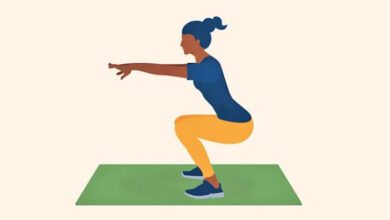
Functional fitness is essential for everyday life, as it helps improve our ability to perform daily activities with ease and efficiency.
The Importance Of Functional Fitness
Functional fitness is an essential aspect of maintaining a healthy lifestyle. By focusing on exercises that mimic real-life movements, functional fitness helps improve overall strength, flexibility, and balance. But what sets functional fitness apart from other exercise routines? Let’s explore the benefits it offers.
Benefits Of Functional Fitness
- Enhances daily activities: Functional fitness exercises aim to improve movements used in everyday life, such as bending, lifting, and reaching. This helps make daily tasks easier and reduces the risk of injury.
- Improves overall strength: Engaging multiple muscle groups simultaneously during functional fitness activities helps build strength and endurance.
- Boosts flexibility and balance: Functional fitness exercises require stabilizing muscles to work together, improving flexibility and balance.
- Prevents injuries: By strengthening the muscles used in everyday movements, functional fitness reduces the likelihood of injuries both in daily life and during physical activities.
- Enhances athletic performance: Functional fitness exercises help athletes develop specific skills and movements necessary for their respective sports.
- Improves quality of life: Regular engagement in functional fitness leads to better overall health, increased independence, and a higher quality of life.
Key Principles Of Functional Fitness
Functional fitness is a training approach that aims to enhance your ability to perform activities of daily life with ease and efficiency. The key principles of functional fitness revolve around movement patterns, core stability, flexibility, and mobility.
Movement patterns: Functional fitness focuses on training movements rather than specific muscles. By incorporating exercises that mimic real-life movements like squats, lunges, and pushing and pulling motions, you can improve your overall functional strength and movement efficiency.
Core stability: A strong core is essential for maintaining balance, stability, and proper posture during everyday activities. Functional fitness exercises targeting the core muscles, such as planks and bridges, help improve core stability and enhance overall functional fitness.
Flexibility and mobility: Stretching and mobility exercises are crucial for maintaining joint flexibility and range of motion. By including exercises like hamstring stretches and shoulder mobility drills in your workout routine, you can improve your functional fitness and reduce the risk of injuries.
Functional Fitness Exercises
Functional fitness is essential for daily activities. Bodyweight exercises are effective for building strength and flexibility. Functional training equipment such as resistance bands and kettlebells are great for simulating real-life movements. These exercises improve balance, coordination, and overall body stability. Incorporating functional fitness into your routine can help prevent injuries and improve your performance in everyday tasks. It’s important to focus on movements that mimic activities you do in daily life. By targeting specific muscle groups, you can enhance your ability to perform daily activities with ease. Whether it’s lifting groceries or bending down to tie your shoes, functional fitness exercises can make these tasks easier and reduce the risk of strains or pains. Make sure to incorporate both bodyweight exercises and functional training equipment into your exercise routine for a well-rounded approach to functional fitness.
Nutrition For Functional Fitness
Fueling your workouts with the right nutrition is essential for functional fitness. When it comes to achieving your fitness goals, macronutrients play a crucial role in providing energy and supporting muscle recovery. Macronutrients consist of carbohydrates, protein, and healthy fats. These nutrients should be consumed in appropriate proportions to optimize your performance and enhance your overall well-being. Carbohydrates are the primary source of energy for your body, while protein helps repair and build muscles. Healthy fats provide essential fatty acids that support brain function and regulate hormones.
The right combination of macronutrients before and after your workouts is important for replenishing glycogen stores and promoting muscle growth. Before your workouts, it is recommended to consume a meal rich in carbohydrates and proteins to provide sustained energy. Post-workout, your body needs a combination of protein and carbohydrates to repair and replenish muscles. Incorporating foods such as whole grains, lean meats, nuts, and seeds into your diet can help ensure you are fueling your workouts with the right nutrients.
Incorporating Functional Fitness Into Daily Routine
Functional fitness is an essential aspect of maintaining a healthy and active lifestyle. By incorporating at-home workouts and workplace fitness, individuals can improve their overall well-being and achieve their fitness goals. In today’s fast-paced world, finding time to exercise can be challenging.
At-home workouts provide a convenient solution for those with busy schedules. Whether it’s a quick 15-minute workout in the morning or a longer session in the evening, exercising at home can be easily integrated into your daily routine. It eliminates the need to commute to the gym and allows you to exercise on your terms.
Workplace fitness is another effective way to incorporate functional fitness into your routine. Simple activities like taking the stairs instead of the elevator, standing up and stretching during breaks, or even organizing group fitness sessions can make a significant difference in your overall fitness levels.
By prioritizing at-home workouts and workplace fitness, you can seamlessly integrate functional fitness into your everyday life and reap the numerous benefits it offers.
Frequently Asked Questions On Functional Fitness For Everyday Life
What Is Functional Training For Daily Life?
Functional training for daily life focuses on exercises that mimic movements used in everyday activities. It enhances strength, flexibility, and balance to improve performance and reduce the risk of injury in everyday tasks. By targeting multiple muscle groups, it helps to improve overall functionality and quality of life.
What Is Functional Movement In Daily Life?
Functional movement in daily life refers to the ability to perform everyday tasks efficiently and without pain. It involves using proper body mechanics, balance, coordination, and strength to perform activities like walking, bending, lifting, and reaching.
Is It Okay To Do Functional Training Everyday?
Yes, it’s okay to do functional training every day. Functional training focuses on movements that enhance daily activities and improve overall fitness. However, it’s important to listen to your body, avoid overtraining, and allow for proper rest and recovery. Consulting a fitness professional can help create a safe and effective daily training plan.
What Is Functional Fitness Examples?
Functional fitness examples include movements that mimic real-life activities, such as squats, lunges, and lifting. It focuses on improving strength, flexibility, and balance for everyday tasks. Other examples are push-ups, kettlebell swings, and medicine ball throws. These exercises enhance overall body functionality and movement.
What Is Functional Fitness And Why Is It Important?
Functional fitness refers to exercises that mimic movements of everyday life, improving strength, balance, and flexibility.
Conclusion
Incorporating functional fitness into your daily routine will lead to improved strength, flexibility, and overall well-being. By focusing on movements that mimic activities of daily living, you can enhance your ability to perform everyday tasks with ease. Embracing functional fitness can help you live a more active, healthier, and fulfilling life.




